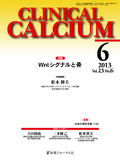Japanese
English
- 有料閲覧
- Abstract 文献概要
- 1ページ目 Look Inside
- 参考文献 Reference
Wnt経路は骨形成において重要な役割を果たしており,スクレロスチンとDickkopf-1はWnt経路を阻害することによって骨量に影響を及ぼしている。スクレロスチンの不活性化は,ヒトや遺伝的操作を加えた動物において骨量増加を誘導する。種々の骨疾患の動物モデルに関する研究によってスクレロスチンに対するモノクローナル抗体は骨形成を促進し,骨密度と骨強度を増加させることが示されている。現在,骨粗鬆症における臨床試験も進行中である。
The Wnt pathway plays an important role in bone formation and regeneration, and expression of two Wnt pathway inhibitors, sclerostin and Dickkopf-1, appears to be associated with changes in bone mass. Inactivation of sclerostin leads to substantially increased bone mass in humans and in genetically manipulated animals. Studies in various animal models of bone disease have shown that inhibition of sclerostin using a monoclonal antibody increases bone formation, density, and strength. Clinical trials are ongoing to evaluate the effects of monoclonal antibodies to sclelostin in humans for the treatment of osteoporosis.



